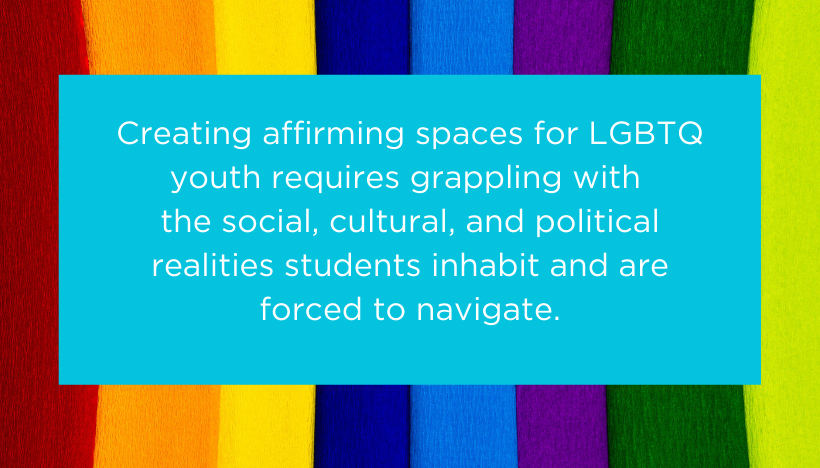From the NCTE LGBTQ Advisory Committee
This school year happened within the broader socio-political landscape in which:
- the United States Supreme Court heard a case that will decide the rights of LGBTQ Americans in the workplace for decades to come,
- the epidemic of murdering Black trans women continued without justice for the victims or legal protective structures,
- the gender-inclusive honorific “Mx.” was debated at school board meetings, and
- public school teachers refused to acknowledge trans students’ humanity.
Creating affirming spaces for LGBTQ youth requires grappling with the social, cultural, and political realities students inhabit and are forced to navigate.
In January, we outlined our goal to “provide a pathway for imagining and creating classrooms where the lives of LGBTQIA*+ students, families, and educators are valued and honored.” Our committee offered pedagogical and curricular resources and examples for a variety of members of NCTE: librarians, teacher educators, elementary and secondary teachers. Examples of our work over the year are shared in the table below:
Additionally, the LGBTQ Advisory Committee worked with the Genders and Sexualities Equality Alliance (GSEA) to establish advocacy material that was featured at this year’s Annual Convention. The materials are available for download here. The material was inspired by NCTE’s Committee Against Racism and Bias in the Teaching of English. It is our hope that teachers across K–12 contexts will download, display, and share the handouts with colleagues, administrators, and families.
It was heartening to see the advocacy material printed and displayed on posters and bookmarks at this year’s AConvention. Equally heartening were the multiple sessions that focused on affirming LGBTQ youth through English language arts curriculum. We hope that educators who presented their work at the Convention consider submitting manuscripts for the upcoming English Journal issue, themed on “Affirming LGBTQ+ Identities.” (If you’re interested, don’t delay—the deadline is January 15,2020.)
Even while celebrating progress and visibility, we must hold ourselves and our organization accountable. The absence of pronouns on name badges worked against the goals of inclusion and affirmation. As educator shea martin reminds, we must “listen and do better.” By not including a place to honor educators’ pronouns on the name badges, the Convention abetted the erasure of educators whose gender identities exist outside the cisgender identity. Such erasure “contributes to the battering of one’s existence.”
We are advocating against that type of harm in schools. We are also advocating against that type of harm in our Convention. Our organization can and must create room to affirm and honor our nonbinary, gender nonconfirming, genderqueer, and gender creative English language arts educators. The gap between our organization’s stated values and actions should be nonexistent. We still have work to do.
We know that when we collectively work to name and challenge the status quo, we can create schools, organizations, and conferences where LGBTQ students, educators, families, and communities are affirmed, liberated, and loved. Let us dedicate ourselves to that mission in the upcoming year.
The NCTE LGBTQ Advisory Committee
Darryn Diuguid is an associate professor of education at McKendree University in Lebanon, Illinois.
Katherine Mason Cramer is an associate professor of English education at Wichita State University, Kansas.
Adam Crawley is an assistant professor of literacy education at Oklahoma State University in Stillwater.
Rick Joseph is a teacher at Birmingham Covington School, where he teaches 5th and 6th grade, in Bloomfield Hills, Michigan.
Cody Miller is an assistant professor at the College at Brockport, State University of New York.
sj Miller is an associate professor at Santa Fe Community College, New Mexico.
Summer Pennell is an assistant professor of English education at Truman State University in Kirksville, Missouri.
Vanessa Perez is the library media specialist at Clinton High School in Clinton, Oklahoma.
Dana Stachowiak is an assistant professor of curriculum and instruction at the University of North Carolina, Wilmington.
Tadayuki Suzuki is an associate professor of literacy at SUNY Cortland in Cortland, New York.
LaMar Timmons-Long is an English teacher at Hudson High School of Learning Technologies in New York City.
Craig Young is an associate professor of teaching and learning at Bloomsburg University of Pennsylvania in Bloomsburg.

